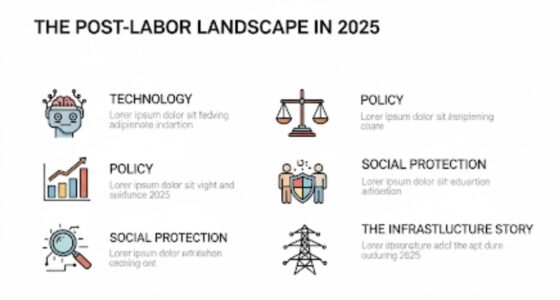A post-work society could be a utopia or a dystopia depending on how we manage change. As technology automates tasks and redefines value, you’ll see shifts in identity, social bonds, and economic models. If we focus on social well-being, equality, and sustainable practices, it could foster community and purpose. But neglecting these aspects risks social fragmentation and inequality. To understand the potential paths forward and what’s at stake, keep exploring these ideas further.
Key Takeaways
- A post-work society could foster utopia through shared purpose, social cohesion, and reduced inequality, but risks dystopia via social fragmentation and exclusion.
- Technological automation may decouple wealth from labor, enabling abundance but challenging traditional employment-based welfare systems.
- Cultural shifts emphasize leisure, community, and personal growth over work, redefining identity and societal value beyond employment.
- Governance and social safety nets are crucial to prevent inequality and social unrest as jobs decline and automation increases.
- The society’s nature—utopian or dystopian—depends on policy choices, technological management, and efforts to promote inclusion and collective well-being.
The Foundations of a Post-Work Future

To understand the foundations of a post-work future, you need to recognize how societal values and institutions are shifting away from traditional notions of work as a central source of identity and economic security. Today, work is increasingly seen as purposive activities, paid or unpaid, aimed at achieving goals rather than defining who you are. Many experiences of work are undesirable, plagued by unsafe conditions, stagnant wages, harassment, and limited rest, making even “good” jobs feel unfree. This challenges the social norms linking justice and welfare to employment. Instead, models like cooperatives and social solidarity illustrate alternative ways to organize society. These shifts suggest a future where social cohesion relies less on employment and more on shared needs, values, and collective well-being. For this transition to be successful, rethinking labor organization and embracing new social frameworks will be essential. Additionally, fostering a sense of community and shared purpose through support networks can play a pivotal role in this evolving landscape. Encouraging creative practice within communities can also enhance collective resilience and innovation in a post-work society. Recognizing the importance of merchant services and secure payment systems can facilitate this transition by supporting community-based economic models and transactions. Moreover, understanding how WWE Raw’s financial impact contributes to global entertainment revenue reveals how alternative economic models can influence societal perceptions of value and success.
Technological Drivers and Economic Shifts

Technological advancements are driving profound economic shifts that reshape how work is organized and experienced. Automation boosts productivity for 90% of knowledge workers, yet also causes sluggish labor demand due to task shifts. As technology evolves, most jobs—about 75%—will require tech skills by 2030, up from 50%. Generative AI threatens to disrupt half of tasks in over 30% of occupations, impacting sectors like healthcare and business. Decluttering practices can help professionals manage the rapid changes by fostering clarity and focus amidst evolving demands. Additionally, adapting to these shifts necessitates developing resilience to navigate an uncertain and rapidly changing job landscape effectively. Recognizing the importance of adaptability in the workforce is crucial for long-term success. Moreover, ongoing discussions at forums such as the UK Government AI Safety Summit highlight the importance of AI safety measures for a sustainable transition. Implementing comprehensive training programs will be vital to equip workers with the necessary skills for this new economy.
Social and Cultural Transformations

As work no longer defines your social identity, you may find your sense of community shifting toward leisure and shared interests. This change prompts you to reevaluate what gives your life purpose outside of traditional roles. How do you build meaningful connections and find fulfillment in a society where work’s influence diminishes? Recognizing the importance of social reproduction and informal activities can help you understand that many of the goods and bonds that sustain community are created through everyday interactions beyond formal employment and unpaid care work.
Identity Beyond Work
Have you ever wondered how your sense of self might change in a society where work no longer defines your identity? In a post-work world, you’ll need to find new sources of meaning. Your identity could shift toward:
- Pursuing hobbies and personal passions that bring fulfillment
- Engaging in community projects and social involvement
- Developing skills unrelated to employment, like arts or sports
- Building relationships beyond professional networks
- Focusing on personal growth and self-discovery
This cultural transformation challenges traditional ideas, pushing you to redefine what makes you who you are. Without work as a primary anchor, you might experience a sense of freedom—or face identity crises. Embracing these changes could lead to a richer, more diverse understanding of yourself beyond job titles. Additionally, exploring personal development through various activities can help foster a well-rounded sense of identity in a post-work society.
Purpose in Leisure
How will the purpose of leisure evolve in a society where work becomes less central to daily life? You might find leisure shifting from a break between tasks to a core activity for self-expression, creativity, and personal growth. As paid employment diminishes, leisure could serve as a platform for community engagement, lifelong learning, and social causes. Activities may blend with informal work, creating hybrid roles that combine enjoyment and productivity. However, access to meaningful leisure might become uneven, influenced by socio-economic status. The cultural significance of leisure will likely expand, emphasizing fulfillment over necessity. Overall, leisure could become an essential space for identity, social connection, and cultural participation, transforming its purpose from mere recreation to a meaningful pursuit shaping individual and societal well-being. Historical context indicates that the relationship between work and leisure has historically been shaped by technological and social changes, suggesting that future transformations could redefine leisure’s role in life.
Social Cohesion Shifts
The shift away from traditional employment will considerably alter social cohesion and cultural dynamics within communities. As jobs disappear or change, trust declines, and social bonds weaken, leading to increased isolation. Migrants without work or networks face exclusion, deepening divisions. Youth unemployment fuels hopelessness, raising risks of violence and crime. When work no longer provides identity or voice, feelings of alienation grow. You might notice:
- Lower community trust with rising unemployment
- Social withdrawal from job loss and depression
- Increased exclusion of migrants and vulnerable groups
- Youth frustration translating into unrest
- Growing alienation when work loses its meaning
These shifts threaten to fracture social fabric unless new ways to value contribution and foster inclusion emerge. Maintaining social cohesion will require redefining societal roles beyond traditional jobs and nurturing shared identity and trust. Additionally, fostering community engagement and creating opportunities for social participation can help rebuild connections and resilience in changing societal landscapes. Recognizing the importance of social capital can further enhance community resilience and cohesion during these transitions.
Rethinking Value and Economic Models

As automation reduces the need for human labor, you’ll need to rethink how value is created and exchanged. Traditional models based on work and scarcity may no longer apply, prompting new ways to distribute resources and wealth. This shift calls for innovative economic frameworks that prioritize decentralization and collective ownership.
Redefining Economic Value
Redefining economic value challenges long-held assumptions by moving beyond the narrow focus on paid labor and market transactions. You’re encouraged to see value in overlooked areas such as:
- Unpaid work like childcare and eldercare, often excluded from GDP
- Socially essential activities in the informal economy
- Gender-biased assessments that undervalue domestic labor performed mainly by women
- Outcomes, sustainability, and social utility as new measures of worth
- Collective well-being, care work, and community services beyond traditional markets. Recognizing organic and natural juices as a form of health-conscious consumption exemplifies how everyday choices impact societal values. This shift questions traditional models that tie worth solely to paid work, urging you to recognize contributions that foster societal resilience. As automation and AI evolve, valuing these diverse activities becomes crucial for creating equitable, sustainable economic frameworks in a post-work society. Recognizing community resilience as a vital component highlights the importance of collective support systems in redefining success, especially in the context of economic models that increasingly incorporate social and environmental factors. Additionally, embracing resources and training can empower communities to develop local solutions and foster sustainable growth, further enriching the broader economic landscape. Furthermore, incorporating Wall organization systems can enhance community engagement and social cohesion by creating shared spaces that foster collaboration and mutual support.
Shifting Resource Distribution
Shifting resource distribution in a post-work society challenges traditional economic models by emphasizing abundance over scarcity. Advanced automation and AI enable plentiful goods with minimal human effort, prompting a reevaluation of value and income. As machines take over production, the link between labor and wealth weakens, pushing us toward models that decouple income from work. Here’s a snapshot of these shifts: compatibility; understanding how different systems function can help shape equitable futures. This transformation highlights the importance of economic restructuring to ensure fair and inclusive access to resources for all members of society. Recognizing the role of social safety nets becomes increasingly vital as traditional employment-based income models evolve, especially as cybersecurity threats like Hack’n Jill remind us of the importance of resilient digital infrastructure.
Political and Ethical Considerations

The political and ethical considerations of a post-work society challenge traditional notions of labor, power, and social justice. You must confront questions like who controls automation, how wealth is distributed, and if power structures will persist. Radical alternatives from anarchist and left-communist thinkers question party politics and aim to abolish involuntary labor. Key issues include:
Exploring post-work society ethics, power, justice, and radical visions to abolish involuntary labor and ensure equitable resource distribution.
- Ensuring equitable resource distribution with policies like universal basic income
- Addressing persistent inequalities related to colonialism, racism, and patriarchy
- Redefining social responsibilities beyond employment-based identities
- Charting power dynamics that may continue to reinforce oppression
- Developing governance models suited for mass automation and widespread unemployment
- Recognizing the importance of vibrational alignment in shaping societal attitudes toward change and adaptation. Incorporating insights from home furnishings, such as ergonomic and adaptable environments, can foster a more inclusive and resilient society. Additionally, promoting emotional well-being through community engagement and supportive spaces is vital for navigating societal transformation.
Navigating the Challenges and Opportunities

Guiding the challenges and opportunities of a post-work society requires careful consideration of how technological advancements can both disrupt and enhance our economic and social systems. Automation and AI are reducing the need for human labor in sectors like manufacturing and services, but they also create new roles focused on managing and optimizing these technologies. The economy may shift toward purpose and societal contribution rather than wealth, though job displacement and economic volatility remain concerns. Nonprofits struggle with financial hardship, and workforce shortages demand continuous skill development. At the same time, flexible virtual work environments and new roles offer opportunities for resilience and innovation. To thrive, you’ll need to adapt quickly, prioritize mental health, and embrace the shift toward purpose-driven work in a rapidly changing landscape.
Frequently Asked Questions
How Will Identity and Purpose Evolve Without Traditional Work Roles?
You might find that without traditional work roles, your sense of identity and purpose shifts toward personal passions, community involvement, or creative pursuits. You’ll likely redefine what gives your life meaning, seeking fulfillment beyond employment. Social recognition may come from volunteering or shared interests, fostering new connections. Embracing these changes, you can develop a broader, more flexible sense of self that isn’t solely tied to work but still offers purpose and belonging.
What Measures Ensure Economic Stability in an Abundance-Based Society?
Imagine a world where bustling factories and busy offices fade into quiet fields of innovation. To keep the economy stable, you’ll rely on universal basic income, ensuring everyone has enough to thrive. Automation takes over routine tasks, freeing you to pursue passions. Sharing resources, embracing circular economies, and participating in democratic decision-making will keep abundance balanced, sustainable, and fair, creating a society where prosperity flows freely without traditional work.
How Can Social Cohesion Be Maintained Without Employment as a Unifying Factor?
You can maintain social cohesion without employment by fostering community engagement through programs, clubs, and cultural events. Encouraging volunteer work and providing education or training opportunities helps build social ties and a sense of belonging. Implementing social support systems, using digital platforms for connection, and promoting inclusive governance create trust and participation. These actions help communities stay united and resilient even when traditional employment is absent.
What Are Potential Risks of Over-Reliance on Automation and AI?
You should consider that over-relying on automation and AI poses risks like increased unemployment, economic inequality, and social fragmentation. When machines replace human roles, workers may face prolonged job loss and skill gaps, leading to stress and social instability. Additionally, excessive automation can reduce human interaction, impacting community bonds and mental health. Without careful management, this dependence might undermine societal resilience and widen existing disparities.
How Do Post-Work Societies Address Mental Health and Human Fulfillment?
Imagine a garden where work once was the only flower; now, in a post-work society, new blossoms like community, creativity, and self-discovery flourish. You find mental health support through accessible counseling, strong community bonds, and diverse programs tailored to your needs. With time freed from labor, you nurture your well-being and purpose, transforming fulfillment into a vibrant, shared garden that sustains your mind and spirit.
Conclusion
As you stand at the crossroads of this new era, remember that the future isn’t set in stone—it’s a canvas waiting for your choices. Whether a utopia or dystopia, it’s up to you to shape the story. Embrace the opportunities, challenge the fears, and paint a world where work is just one brushstroke in your masterpiece of meaning and connection. The future’s yours to create—what will you make of it?









